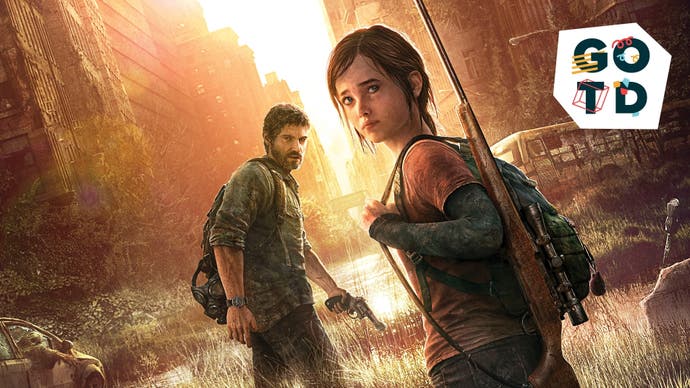Games of the Decade: The Last of Us is a masterclass in silent storytelling
Shh.
To mark the end of the 2010s, we're celebrating 30 games that defined the last 10 years. You can find all the articles as they're published in the Games of the Decade archive, and read about our thinking about it in an editor's blog.
"Is this really all they had to worry about?" Ellie asks, perched on a stained bedspread beneath the faded posters of a now long-forgotten teen. "Boys? Movies? Deciding which shirt goes with which skirt? It's bizarre."
The Last of Us is stamped with what once was and never will be again. It is a world so ravaged by death that still, decades later, it offers little respite for its survivors. Bodies rot under the midday sun, as others - bloated and moist - decay in sewers. They sit mouldering in vehicles choking off-ramps and cower behind boarded-up windows in empty suburbs. It is an endless, relentless reminder of yesterday that offers scant hope for tomorrow, but it is also Joel and Ellie's reality. As such, the poignancy of this broken world - and this broken man - gut-punched my emotions in a way I didn't quite expect.
I couldn't acclimatise to Joel's life of scavenging and savagery, though. I rarely felt safe. Each confrontation, be they human or otherwise, felt too desperate, too distressing. I couldn't comfortably pick through the grimy remnants of someone else's life, pushing past unfinished dinner plates and teddy bears and candid holiday snapshots to rummage through cupboards and sideboards in search of unlooted supplies.
Joel, on the other hand? Life has worn away whatever soft, tender parts he once had. Grief has suffocated his humanity. He is ruthless and selfish and cruel and uncompromising in a way so seldom seen, utterly bereft of humour and heart - a survivor surviving when there's nothing left to survive for.
We've spent a lot of time in the company of flawed heroes; video games are rife with them. But Joel is more flawed than most, and with a shocking propensity for violence. Most of us expected him to Do The Right Thing In the End, but... well, he didn't. I don't really understand why I was so surprised. That final self-serving act was hardly out of character, was it? Not even Ellie - Ellie who grew to love him anyway, Ellie who broke through every wall he placed between her heart and his - believed his smooth lies in the end.
No, The Last of Us wasn't the industry's first foray into zombie games and yes, it uses a smorgasbord of rote, if competent, paint-by-number mechanics like crafting, upgrading, and unremarkable cover-based combat. The humankind-is-its-own-true-enemy theme isn't particularly novel, either. Yet The Last of Us remains the only game to make me grieve for characters I never met, mourn a world I never saw, and root for this broken man and his live cargo.
The true triumph of The Last of Us, however, is that even if Ellie and Joel never opened their mouths, their story would still be told (I know; it's offensive to even imagine this game without its BAFTA-winning voice cast, but bear with me here). You see, this game is every bit as powerful with its world-building as it is its script and VO performances. It is a masterclass in environmental storytelling. For every overt clue about post-apocalyptic life, there are five secreted in Naughty Dog's astonishing environments.
And along with the literal death that litters the streets and staggers after you in spore-filled hallways - I still, genuinely, have nightmares populated with that clicking sound - this story is about the death of innocence, too. It is an unrelenting, disquieting and thoroughly grim tale of love and loss and my god, I cannot wait for its sequel.


